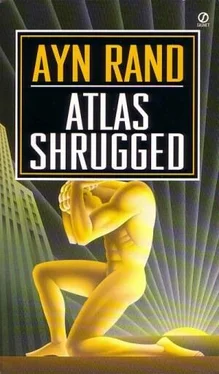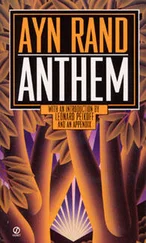"No! He hasn't had enough! He hasn't even screamed yet!"
"Jim!" cried Mouch suddenly, terrified by something in Taggart's face. "We can't afford to kill him! You know it!"
"I don't care! I want to break him! I want to hear Mm scream! I want—"
And then it was Taggart who screamed. It was a long, sudden, piercing scream, as if at some sudden sight, though his eyes were staring at space and seemed blankly sightless. The sight he was confronting was within him. The protective walls of emotion, of evasion, of pretense, of semi-thinking and pseudo-words, built up by him through all of his years, had crashed in the span of one moment—the moment when he knew that he wanted Galt to die, knowing fully that his own death would follow.
He was suddenly seeing the motive that had directed all the actions of his life. It was not his incommunicable soul or his love for others or his social duty or any of the fraudulent sounds by which he had maintained his self-esteem: it was the lust to destroy whatever was living, for the sake of whatever was not. It was the urge to defy reality by the destruction of every living value, for the sake of proving to himself that he could exist in defiance of reality and would never have to be bound by any solid, immutable facts. A moment ago, he had been able to feel that he hated Galt above all men, that the hatred was {woof of Galt's evil, which he need define no further, that he wanted Galt to be destroyed for the sake of his own survival. Now he knew that he had wanted Galt's destruction at the price of his own destruction to follow, he knew that he had never wanted to survive, he knew that it was Galt's greatness he had wanted to torture and destroy—he was seeing, it as greatness by his own admission, greatness by the only standard that existed, whether anyone chose to admit it or not: the greatness of a- man who was master of reality in a manner no other had equaled. In the moment when he, lames Taggart, had found himself facing the ultimatum: to accept reality or die, it was death his emotions had chosen, death, rather than surrender to that realm of which Galt was so radiant a son. In the person of Galt—he knew—he had sought the destruction of all existence.
It was not by means of words that this knowledge confronted his consciousness: as all his knowledge had consisted of emotions, so now he was held by an emotion and a vision that he had no power to dispel. He was no longer able to summon the fog to conceal the sight of all those blind alleys he had struggled never to be forced to see: now, at the end of every alley, he was seeing his hatred of existence—he was seeing the face of Cherryl Taggart with her joyous eagerness to live and that it was this particular eagerness he had always wanted to defeat—he was seeing his face as the face of a killer whom all men should rightfully loathe, who destroyed values for being values, who killed in order not to discover his own irredeemable evil.
"No . . ." he moaned, staring at that vision, shaking his head to escape it. "No . . . No . . . "
"Yes," said Galt.
He saw Galt's eyes looking straight at his, as if Galt were seeing the things he was seeing.
"1 told you that on the radio, didn't I?" said Galt.
This was the stamp James Taggart had dreaded, from which there was no escape: the stamp and proof of objectivity. "No . . ." he said feebly once more, but it was no longer the voice of a living consciousness.
He stood for a moment, staring blindly at space, then his legs gave way, folding limply, and he sat on the floor, still staring, unaware of his action or surroundings.
"Jim . . . !" called Mouch. There was no answer.
Mouch and Ferris did not ask themselves or wonder what it was that had happened to Taggart: they knew that they must never attempt to discover it, under peril of sharing his fate. They knew who it was that had been broken tonight. They knew that this was the end of James Taggart, whether his physical body survived or not.
"Let's . . . let's get Jim out of here," said Ferris shakily. "Let's get him to a doctor . . . or somewhere . . ."
They pulled Taggart to his feet; he did not resist, he obeyed lethargically, and he moved his feet when pushed. It was he who had reached the state to which he had wanted Galt to be reduced. Holding his arms at both sides, his two friends led him out of the room.
He saved them from the necessity of admitting to themselves that they wanted to escape Galt's eyes. Galt was watching them; his glance was too austerely perceptive.
"We'll be back," snapped Ferris to the chief of the guards. "Stay here and don't let anyone in. Understand? No one."
They pushed Taggart into their car, parked by the trees at the entrance. "We'll be back." said Ferris to no one in particular, to the trees and the darkness of the sky.
For the moment, their only certainty was that they had to escape from that cellar—the cellar where the living generator was left tied by the side of the dead one.
CHAPTER X
IN THE NAME OF THE BEST AMONG US
Dagny walked straight toward the guard who stood at the door of "Project F". Her steps sounded pourposeful, even and open, rining in the silence of the path among the trees. She raised her head to a ra of moonlight, to let him recognize her face.
"Let me in," she said.
"No admittance," he answered in the voice of a robot. "By order or Dr. Ferris."
"I am here by order of Mr. Thompson."
"Huh? . . . I . . . I don't know anything about that."
"I do."
"I mean, Dr. Ferris hasn't told me . . . ma'am."
"I am telling you."
"But I'm not supposed to take any orders from anyone excepting Dr. Ferris."
"Do you wish to disobey Mr. Thompson?"
"Oh, no, ma'am! But . . . but if Dr. Ferris said to let nobody in, that means nobody-" He added uncertainly and pleadingly, "-doesn't it?"
"Do you know that my name is Dagny Taggart and that you've seen my pictures in the papers with Mr. Thompson and all the top leaders of the country?"
"Yes, ma'am."
"Then decide whether you wish to disobey their orders."
"Oh, no, ma'am! I don't!"
"Then let me in."
"But I can't disobey Dr. Ferris, either!"
"Then choose."
"But I can't choose ma'am! Who am I to choose?"
"You'll have to."
"Look," he said hastily, pulling a key from his pocket and turning to the door, "I'll ask the chief. He-"
"No." she said.
Some quality in the tone of her voice made him whirl back to her: she was holding a gun pointed levelly at his heart.
"Listen carefully," she said. "Either you let me in or I shoot you.
You may try to shoot me first, if you can. You have that choice—and no other. Now decide."
His mouth fell open and the key dropped from his hand.
"Get out of my way," she said.
He shook his head frantically, pressing his back against the door.
"Oh Christ, ma'am!" he gulped in the whine of a desperate plea. "I can't shoot at you, seeing as you come from Mr. Thompson! And I can't let you in against the word of Dr. Ferris! What am I to do? I'm only a little fellow! I'm only obeying orders! It's not up to me!"
"It's your life." she said.
"If you let me ask the chief, he'll tell me, he'll—"
"I won't let you ask anyone."
"But how do I know that you really have an order from Mr. Thompson?"
"You don't. Maybe I haven't. Maybe I'm acting on my own—and you'll be punished for obeying me. Maybe I have—and you'll be thrown in jail for disobeying. Maybe Dr.. Ferris and Mr. Thompson agree about this. Maybe they don't—and you have to defy one or the other. These are the things you have to decide. There is no one to ask, no one to call, no one to tell you. You will have to decide them yourself."
"But I can't decide! Why me?"
"Because it's your body that's barring my way."
Читать дальше










